
学園ブログ

- ホーム
- 世界へはばたく
世界へはばたく

2017年11月24日
高校1年生 クリティカル・シンキングのハロウィーン授業より
 High school first graders take lessons called Critical Thinking twice a month, which was briefly introduced by Principal Nakai in his blog in May. The goals of the course are to improve students’ thinking, discussion skills and presentation skills. At the end of October, students took part in a Halloween-themed role play discussion that we called “Zombie Nightmare.”
High school first graders take lessons called Critical Thinking twice a month, which was briefly introduced by Principal Nakai in his blog in May. The goals of the course are to improve students’ thinking, discussion skills and presentation skills. At the end of October, students took part in a Halloween-themed role play discussion that we called “Zombie Nightmare.”
In a role play discussion, students are given a role and a problem or situation to discuss. In the Zombie Nightmare discussion, their roles were four people trapped in a large house that was filled with zombies! Students were given role cards that explained their character’s skills, goals, and so on. For example, the police officer is strong and noisy, and has various equipment that a police officer might have, such as a pistol, nightstick and handcuffs. Also, the police officer’s goal is to help everyone.
Once the roles were explained, students were given a detailed map of the house and began to discuss what to do. Their problems included how to deal with the zombies, how to open certain locked doors, how to save friends trapped on a different floor, and ultimately how to escape the house.
One clear advantage of a role play discussion compared to a discussion where students are themselves is that the roles given mean students will have opinions to contribute. In a normal discussion, some students might not be interested in the topic and may have no opinion on it. Also, in the case of the Zombie Nightmare, we gave slightly conflicting goals to each role. For example, the police officer wanted to save everyone, but another character wanted to leave the house as quickly as possible. Such tensions promoted a more aggressive style of discussion but still within the cooperative context of working together to create a plan. Finally, the theme and game-like nature of the activity motivated and challenged students. During the lessons, the teachers noted students were participating very actively and doing an excellent job using their English to explain and discuss their ideas.
We will continue to deliver lessons offering a balance of fun, cooperation and challenge in our Critical Thinking Classes.
高校1年生では、月2回、中井校長が5月のブログで紹介して下さったクリティカル・シンキングという英語の授業を受けています。この授業での目標は、批判思考力、ディスカッション能力とプレゼンティション能力を高めることです。ハロウィーンを祝うため10月末に、「ゾンビ・ナイトメア」というロールプレー・ディスカッションをしました
普通のディスカッションでは、生徒は自分の意見を言いますが、ロールプレー・ディスカッションでは登場人物(キャラクター)の立場で意見を言います。「ゾンビ・ナイトメア」では、4人のキャラクターがゾンビでいっぱいの大きな家で罠にかけられています。まず、各生徒には、自分のキャラクターの目標や道具などを説明されたロールカードが配られました。例えば、警察のキャラクターは皆を守ることが目標で、道具として、拳銃や手錠などを持っています。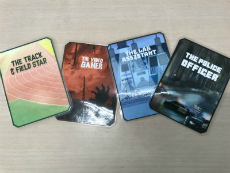
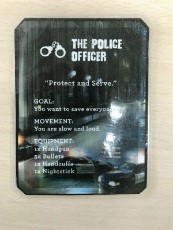
次に、家の地図が配られ、ディスカッションが始まりました。ディスカッションの論点は色々と出てきました。例えば、ロックされたドアを開ける方法や3階で罠にかけられた友達を助ける方法などです。もちろん、ゾンビに何をすれば良いのかも話し合っていました。そして最後に、家からどうやって逃げるかという問題も出てきました。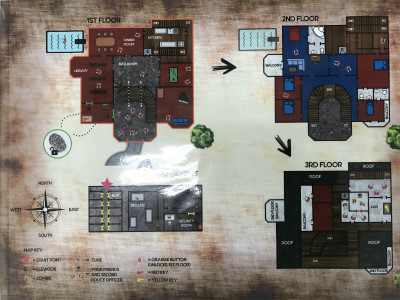
普通のディスカッションとロールプレー・ディスカッションを比べると、はっきりと分かる大きな違いが1つあります。それは、ロールプレー・ディスカッションは登場人物として参加するので、意見が言いやすいことです。残念ですが、普通のディスカッションでは、話題に興味がないと参加しない生徒が時々います。また、ロールプレー・ディスカッションでは、面白い状態を創造することが出来ます。この「ゾンビ・ナイトメア」では、それぞれの登場人物同士が衝突する場面が出てきます。例えば、警察は皆を守らなければならないのに、他の登場人物はなるべく早く逃げたいと言います。こういった状況の中で、生徒たちは協力して、ある程度の文脈の英語で積極的にディスカッションし、一緒にプランを創造しなければなりません。
何よりも、このアクティビティは、生徒たちが積極的にコミュニケーションを図る動機を与えてくれました。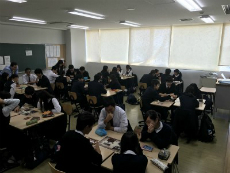
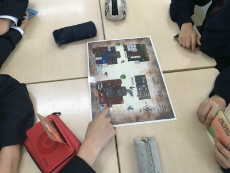
これからも、生徒たちが、楽しみながら協力し、チャレンジできる授業を提供していきたいと強く思っております。
(中高校教諭 スティーブン スワン)
